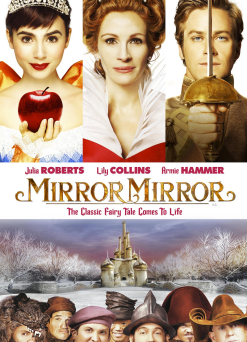By Michael Scoular (The Cascade) – Email
Print Edition: April 4, 2012
 “An idealized version of themself, a monarch in a very twisted kingdom.” So goes a line from Tarsem Singh’s first feature The Cell, one that could easily be re-appropriated to any of the director’s subsequent works, for on a surface level each of them has some connection to fairy tales, myths, dreams, alternate forms of the self and the world.
“An idealized version of themself, a monarch in a very twisted kingdom.” So goes a line from Tarsem Singh’s first feature The Cell, one that could easily be re-appropriated to any of the director’s subsequent works, for on a surface level each of them has some connection to fairy tales, myths, dreams, alternate forms of the self and the world.
In Mirror Mirror, Julia Roberts is the queen, who has a mirror that speaks back as a perfected version of herself. The story, said to be told from the queen’s perspective, indicates a shifting of the Snow White tale to be skewed more in the delusionary indulgences and startling blood and fabric of Tarsem’s other films. However, what is significant here is how he, while still claiming the story as his, has scaled his attention-grabbing down to a smaller scale. He has framed his characters not as grains of sand, but as impressive storybook characters.
Mirror Mirror announces its intentions from the first scene, which encapsulates exposition in doll-figured grandiosity. It is storytelling visually related to, but distinct from, the reading of fables in Harry Potter and the Deathly Hallows Part 1. Yet, here it is tinged with sarcasm as Roberts relates the setup. This kind of knowing sideways glance continues throughout, but unlike the postmodern sneer of many modern fairytales, which deign to kids but would prefer to reel adults in, it arises more out of an incredulous disbelief. It is as if Snow White is being let out of a cloistered existence and seeing a fantastic world for the first time (which she is), a bubbling enthusiasm to spit out what’s on the character’s active mind, which also makes for the most nervous, lovesick stammers in a movie since The Three Musketeers. All this is rooted in the tonally-balanced performances of Lily Collins and Armie Hammer, who both know how to show concern for a nonsensical situation without mocking it and easily adapt to silly costume changes with a lightweight, but radiant comedic touch. Mirror Mirror isn’t faithful to any one folk tale, re-appropriating elements from a variety, but its deviations result in something innocently different, removing the warning and sinister threads of the fairy tale, leaving behind the eye-glistened looks of not-so-forbidden love and constant celebration.
The look of Mirror Mirror is one of sections, maybe intentionally left as pages, where space is cordoned off into sets of extravagance and environments can’t touch the characters. It’s a limbo-like world, where everything is exactly as it was the first time around, dropping the difficulties of navigating the woods or finding the way back home in favour of images where faces and dresses take up entire frames. This is the last film Eiko Ishioka, a costume designer who will become a legend if she isn’t considered one already, made before her passing earlier this year, and her repeated collaborations with director Tarsem are a testament both to Ishioka’s unrepeatable creativity and Tarsem’s love for showcasing beauty in his images.
Of all the moments of love, both between characters and materials, it’s a single shot of the dwarves of the tale reacting to news of Snow White leaving them that strikes both poles of this movie. Led by Jordan Prentice, Mark Povinelli and Danny Woodburn, the dwarves mainly occupy the comic relief (in a movie that’s almost all comic relief) and spur the most banal moments of the picture (a training montage, the mostly sidetracking action scenes, and they’re also the impetus for most of Alan Menken’s candidates for most obvious, berating score of the year), yet in a single shot that Tarsem holds for as long as he can, they also show themselves to be yet another part of a movie that cares about how it presents itself.
There are some lines about being true to yourself, and on and on, but in the intimations between the characters and the loving way in which they are shown, the purpose of Mirror Mirror isn’t reducible to an underlying moral in the tradition of fairy tale endings. It is more of a consideration of the form as malleable to Tarsem’s sensibility, yet another teller of an oft-told story, one with an eye towards what’s come before. Tarsem doesn’t make great movies, but he does make them his, which also means Mirror Mirror, in the end, celebrates itself.


